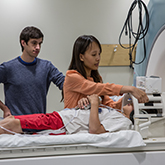SEED Science Transforms Lives
From trauma and homelessness to poverty and discrimination, adversity plays a big role in children's development and well-being. In 2014, the Department of Psychology created the SEED (Stress, Early Experiences, and Development) Research Center to study the impact of adversity on children and families.
SEED faculty work in teams alongside students, staff, and postdoctoral fellows to study ways in which early experiences shape development over a lifespan.
Working with community partners, the scientists study populations experiencing a range of adversities such as homelessness, low income, justice system involvement, or mental and physical health issues. As researchers develop and identify interventions that build resilience, those programs become sustainable in the community.
SEED teams are designing interventions and policies that can change lives. For example, one area of focus involving several teams is the prenatal period.
"The prenatal period is a time of incredible change both for the mother and for her child. This is a period both of vulnerability and resilience," said Elysia Davis, professor and co-director of the SEED Research Center. "Several researchers and interventionists are focused on increasing knowledge about and testing promising interventions for women and infants during the prenatal period and transition to parenting."
- Dr. Angela Narayan is examining parents' early life experiences and its relation to emotional and relationship well-being during the prenatal period. Funding provided by the Society for Research in Child Development, and the Guardian of Angels Foundation.
- Dr. Pilyoung Kim is examining maternal and infant brain development in the early post-natal period. She is connecting dramatic changes to the brain during the transition to parenting with early infant development. Funding provided by the National Institute of Child Health and Human Development, and the National Institute on Drug Abuse.
- Dr. Elysia Davis is conducting an intervention designed to improve mothers' mental health during the prenatal period. The Care Project examines whether, in addition to providing benefits for mothers' mental health, prenatal intervention creates positive effects on infant brain development through 18 months of age. Funding provided by the National Institute of Mental Health with support from Ubiome.
- Dr. Galena Rhoades is providing a relationship intervention for pregnant women and new mothers to reduce intimate partner violence and improve relationship health. The MotherWise program focuses on reducing the risk that women face for violence, relationship problems, family instability, and stress during pregnancy and just after a baby is born. Initial funding provided by a Healthy Marriage and Relationship Education grant from the Administration for Children and Families (ACF) at the U.S. Department of Health and Human Services.
Together, SEED faculty are demonstrating their collaborative power and potential to advance science and inform policy and practice. Their leading-edge research allows the generation of new knowledge to continue while also providing rich learning experiences for their students.
"We are seeding the future by developing a new generation of scholars who know how to do SEED research, teach in integrative and collaborative ways, and engage in real cross-sector dialogue to advance policy and practice," said Davis.
Students working in the Center benefit from outstanding training and mentoring experiences. These scholars-in-training will become experts in multiple research specialties and produce substantial contributions to the knowledge in the field of psychology.
To support the important research, student training, and community programs, consider investing in SEED science.



